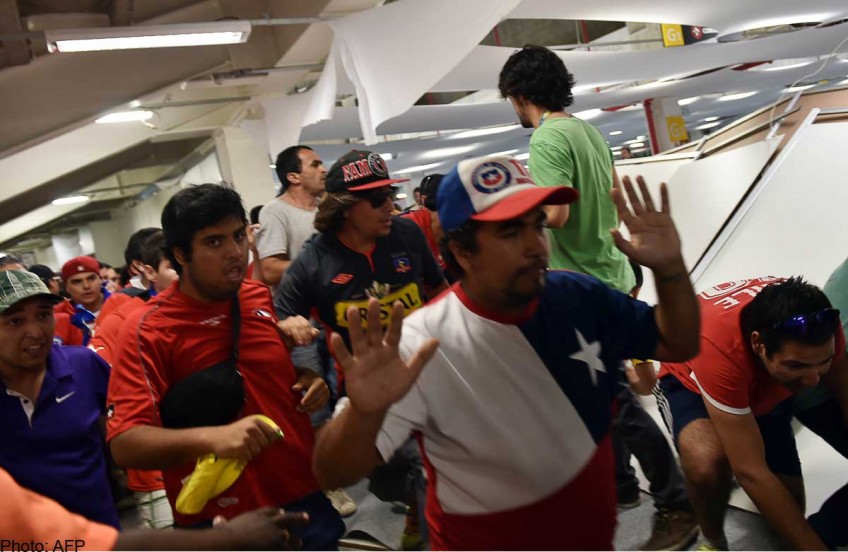Chaos at the Maracana


BRAZIL - Breaching stadium security here is relatively easy. It's an embarrassing story that Fifa isn't eager to share, but the reality is rather humbling.
World Cup security is a bit of a shambles. Yesterday, around 100 Chile supporters forcibly made their way through a security checkpoint at the Maracana Stadium just an hour before their fixture with Spain, when there would have been a discernible police and security presence around the stadium's perimeter.
Yet 100 Chileans broke down a flimsy wall in the media centre before running down a corridor. Fifa and stadium security got lucky.
In their desperation, the Chileans ran past unguarded, unchecked escalators that would've carried them directly into the grandstands. They missed an open stairway to heaven.
Almost 100 trespassers were just an escalator away from breaking into the most prestigious football arena at the world's biggest sporting spectacle.
Trespassing at the Maracana and World Cup venues generally, seems easier than sneaking into a midweek S.League game.
Displaying a haste that was beyond them during the break-in, Fifa's organisers released a statement saying: "The situation was brought under control quickly... the organisers of the Fifa World Cup condemn these acts of violence."
This was another Fifa mistake. The supporters broke into a media centre. There were a couple of hundred eyewitnesses who all happened to be journalists who refused to corroborate Fifa's story.
Panic
First, there were no physical acts of violence. This was not the orchestrated work of a hardcore hooligan faction, but the random, spontaneous act of panicking men, mostly middle-aged, who were swept up in the moment and the siege mentality took hold.
That's not to condone the trespassing, but no one was attacked, assaulted or abused and the contrite Chileans expressed remorse once they'd settled down.
And second, the situation was not brought under control quickly. The Chileans delivered themselves into the hands of security by taking a wrong turn. They were not apprehended by quick-thinking officers displaying Colombo's powers of reasoning. Fifa got away with it, this time.
On two occasions, I have trespassed around different World Cup stadiums; the first time inadvertently, the second deliberately so.
In Manaus, I couldn't find the accreditation counter in the ramshackle, dusty, fenced-off building site that doubled as a part-time World Cup stadium.
As my request was lost in translation by a kind Portuguese volunteer, I was sent in the wrong direction, circumnavigating the stadium and wandering through what was clearly a restricted area where some heavy-duty construction was still taking place on one of the stands.
I passed construction workers and supervisors as forklifts trundled past and a welder's sparks danced in the air. No one stopped me.
When I finally reached the media centre, a Fifa volunteer turned positively apoplectic: "You shouldn't be here. You shouldn't be here. You have no pass. You have no pass."
My honest explanation that a fellow volunteer had sent me round the back of the stadium without the appropriate accreditation was given short shrift. Instead, I was shuffled out of the media centre with all the grace and diplomacy reserved for a terror suspect.
During the England-Italy game in Manaus, fans wandered into the press box to take pictures. A burly Brazilian holding a beer made his way to my seat, threw his arm around me and asked for a selfie.
He was harmless, but he had crossed a line considered unacceptable at most sporting venues. In Sao Paulo, the Arena Corinthians stadium is similarly chaotic and disorganised. Some $400 million has already been spent, but the venue's roof has been delayed until after the World Cup.
Unfinished
A huge tarpaulin cover hides the unfinished, unattractive face of an entire stand. The incessant whine of pneumatic drills echoes around the arena, construction workers outnumber Fifa volunteers and security guards and uncovered electrical cables hang from exposed ceilings.
There aren't enough flimsy partitions - the kind of partitioned wall the Chileans pushed through in the Maracana - to mask the stadium's unsightly underbelly.
Amid the mess, I wandered towards the pitch unchecked. Making a video for The New Paper, I passed a security guard sitting on plastic garden furniture. I strolled past a second by tapping a finger against my media pass and made my way into the grandstand.
The stadium was closed to all accept burly men in hard hats, buzzing like worker bees in a frantic bid to iron out the construction kinks in time for the England and Uruguay game this morning (Singapore time).
But I was left undisturbed to make my video in peace. And yet, I was denied entry to a Fifa Fan Fest zone in the Sao Paulo city square because I was carrying a dangerous weapon - a selfie stick.
Throughout this tournament, organisers are struggling to see the wood for the trees.
None of this is visible on Singapore's high-definition TV screens of course. Images of pristine pitches and fans resplendent in their national colours evoke the glorious gaiety of the Beautiful Game.
But confusion reigns in a country which insisted on stretching its resources across 12 cities, rather than eight, taking Fifa's Big Top to venues struggling to sustain the circus.
And as the Maracana farce demonstrated, there are too many clowns disrupting the show.
npsports@sph.com.sg

This article was first published on June 20, 2014.
Get The New Paper for more stories.